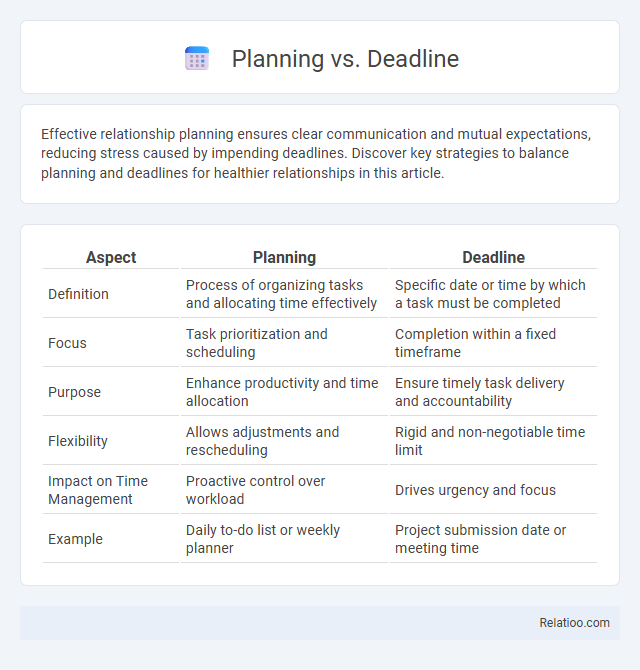Effective relationship planning ensures clear communication and mutual expectations, reducing stress caused by impending deadlines. Discover key strategies to balance planning and deadlines for healthier relationships in this article.
Table of Comparison
| Aspect | Planning | Deadline |
|---|---|---|
| Definition | Process of organizing tasks and allocating time effectively | Specific date or time by which a task must be completed |
| Focus | Task prioritization and scheduling | Completion within a fixed timeframe |
| Purpose | Enhance productivity and time allocation | Ensure timely task delivery and accountability |
| Flexibility | Allows adjustments and rescheduling | Rigid and non-negotiable time limit |
| Impact on Time Management | Proactive control over workload | Drives urgency and focus |
| Example | Daily to-do list or weekly planner | Project submission date or meeting time |
Understanding the Difference: Planning vs Deadline
Planning involves outlining tasks, milestones, and resources required to achieve a goal within a set timeframe, ensuring efficient workflow and risk management. A deadline is a fixed date or time by which a specific task or project must be completed, serving as a critical benchmark to measure progress and maintain accountability. Understanding the difference between planning and deadlines enables better project management, as planning focuses on the process and scheduling, while deadlines enforce time constraints and completion targets.
The Role of Planning in Successful Projects
Effective planning establishes clear objectives, timelines, and resource allocation, which directly influence meeting project deadlines and ensuring overall success. Your ability to anticipate challenges and adjust strategies during the planning phase reduces risks and enhances team productivity, making deadlines more achievable. Strong planning ultimately drives project momentum and aligns efforts towards delivering outcomes on time and within scope.
Why Deadlines Matter in Achieving Goals
Deadlines create a sense of urgency that drives focused effort and improves time management, ensuring consistent progress toward goals. Without deadlines, tasks may be postponed indefinitely, reducing productivity and clarity in achieving milestones. Structured planning aligned with deadlines enhances accountability and momentum, making goal attainment more efficient and measurable.
Common Pitfalls of Prioritizing Deadlines Over Planning
Prioritizing deadlines over planning often leads to rushed decisions, incomplete work, and increased stress, compromising the quality of Your projects. Neglecting thorough planning can cause unforeseen obstacles and inefficient resource allocation, ultimately hindering productivity. Understanding the balance between setting realistic deadlines and detailed planning is crucial to avoid common pitfalls such as missed milestones and burnout.
Balancing Flexibility in Planning with Firm Deadlines
Balancing flexibility in planning with firm deadlines requires dynamic scheduling techniques that adapt to changing priorities without compromising project milestones. Incorporating buffer times and milestone checkpoints enhances responsiveness while maintaining accountability and progress tracking. Effective communication and resource allocation ensure plans remain flexible yet aligned with critical deadlines, minimizing risks and maximizing productivity.
Strategies for Effective Planning Within Tight Deadlines
Effective planning within tight deadlines requires prioritizing tasks based on urgency and impact to maximize productivity. Utilizing time-blocking methods and setting clear milestones ensures steady progress and prevents last-minute rushes. Leveraging tools like Gantt charts and project management software helps visualize deadlines, allocate resources efficiently, and adjust plans dynamically to meet critical timelines.
The Impact of Deadlines on Team Productivity
Deadlines significantly influence team productivity by creating a sense of urgency that drives focus and prioritization of tasks. However, unrealistic or poorly managed deadlines may lead to stress, reduced morale, and burnout, ultimately hindering overall performance. Your effective planning must balance ambition with feasibility to ensure deadlines enhance, rather than impair, team output.
Adapting Your Plan When Deadlines Change
Adapting your plan when deadlines change requires flexibility and continuous reassessment of project priorities to maintain efficiency. Revising timelines based on updated deadlines ensures resource allocation aligns with critical milestones, preventing workflow disruptions. Effective communication within teams supports seamless transitions and timely delivery despite shifting schedules.
Real-World Examples: Planning Triumphs vs Deadline Disasters
Effective planning enables teams to anticipate challenges and allocate resources efficiently, resulting in successful project completion ahead of deadlines, as seen in NASA's Mars Rover missions. In contrast, projects driven solely by rigid deadlines often face delays, cost overruns, and compromised quality, exemplified by the Boeing 787 Dreamliner's repeated delivery postponements. Real-world cases highlight that strategic planning consistently outperforms mere deadline adherence in achieving project goals.
Best Practices for Harmonizing Planning and Deadlines
Effective harmonization of planning and deadlines involves setting realistic timelines that align with project goals and resource availability. Prioritizing tasks and regularly reviewing progress allows you to adjust plans proactively, ensuring deadlines remain achievable without compromising quality. Clear communication and flexibility in managing both planning and deadlines enhance productivity and reduce stress throughout the project lifecycle.

Infographic: Planning vs Deadline
 relatioo.com
relatioo.com